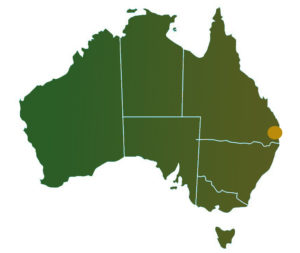THE AUSTRALIAN GINGER INDUSTRY
The Sunshine Coast and Wide Bay regions of South East Queensland Australia is the main growing area for Australia’s ginger production. A sub-tropical rainforest environment and rich soils provide the perfect conditions for cultivating 8000 tonnes per year of ginger for Australia’s fresh and processing markets. Ginger is also grown in North Queensland and Northern New South Wales.
 The current farm-gate value of the Australian ginger industry is A$32 million. This figure represents the value of both the wholesale fresh market and first stage processing market in Australia. Total ginger production in Australia has averaged 8000 tonnes in recent years, with about 60% of production supplied to the Australian domestic fresh market and 40% supplied to the first stage processing market.
The current farm-gate value of the Australian ginger industry is A$32 million. This figure represents the value of both the wholesale fresh market and first stage processing market in Australia. Total ginger production in Australia has averaged 8000 tonnes in recent years, with about 60% of production supplied to the Australian domestic fresh market and 40% supplied to the first stage processing market.
Ginger is a vital ingredient in a wide range of semi-processed products for the food manufacturing sector and processed products for the retail sector. The value of these products, in which Australian ginger is a key ingredient, is estimated at over A$100 million. The value of sales of semi-processed and processed ginger products in the domestic market is over A$60 million. Exports of Australian semi-processed and processed ginger products are currently valued at A$40 million.
The Australian ginger industry employs hundreds of families by providing jobs in farm production, packing sheds, markets, transport and farm input suppliers. Australian born ginger food and beverage processing companies like Buderim Ginger, Bundaberg Brewed Drinks and Gourmet Garden are all significant regionally based employers.
FOOD SAFETY
The Australian ginger industry understands that there is no issue more important than food safety and that it is of great concern to both processors and consumers. AGIA has developed several protocols and procedures to ensure the production of safe, food quality ginger.
The industry is continually enhancing every step of growing, harvesting and transporting ginger. Together with the Australian government AGIA invests every year into research that will improve quality and food safety systems.
“Growing healthy Australian ginger is achieved by using healthy ginger seed with the very best agronomic and hygiene practices.”
BIOSECURITY
The Ginger Industry Biosecurity Plan (IBP) is a framework to coordinate biosecurity activities and investment for Australia’s ginger industry. It provides a mechanism for industry, governments, and stakeholders to better prepare for, and respond to, incursions of Emergency Plant Pests that could have significant impacts on the ginger industry.
With the help of the industry’s biosecurity plan AGIA helps it’s members to:
![]() evaluate the biosecurity risks within their farming and business activities,
evaluate the biosecurity risks within their farming and business activities,
![]() to formally identify and prioritise exotic plant pests, and
to formally identify and prioritise exotic plant pests, and
![]() focus on future biosecurity challenges.
focus on future biosecurity challenges.
The ginger IBP was developed in consultation with an Industry Biosecurity Group (IBG), a select group of plant health and biosecurity experts. The IBG was coordinated by Plant Health Australia (PHA) and included representatives from the Australian Ginger Industry Association (AGIA), relevant state and territory agriculture agencies and research organisations.
For more information visit: www.planthealthaustralia.com.au
THE EMERGENCY PLANT PEST RESPONSE DEED
The Emergency Plant Pest Response Deed (EPPRD) is an essential part of Australia’s plant biosecurity system – providing a binding process for government and industry if an emergency plant pest incursion occurs.
The EPPRD is a formally binding agreement between Plant Health Australia, the Australian government, all state and territory governments, and AGIA. It covers the management and funding arrangements of eradication responses to Emergency Plant Pest (EPP) incidents.
The EPPRD allowed AGIA to be directly involved in setting up framework and to manage an EPP response. It also ensures costs are minimised for all parties and growers may be eligible for reimbursement of certain costs if their crops or property is directly damaged or destroyed as a result of implementing an approved response plan.
The EPPRD shows that Australian ginger industry is seriously commitment to risk mitigation, early detection and rapid response through the development and implementation of biosecurity strategies and programs.
For further information on the EPPRD visit www.planthealthaustralia.com.au/epprd.
